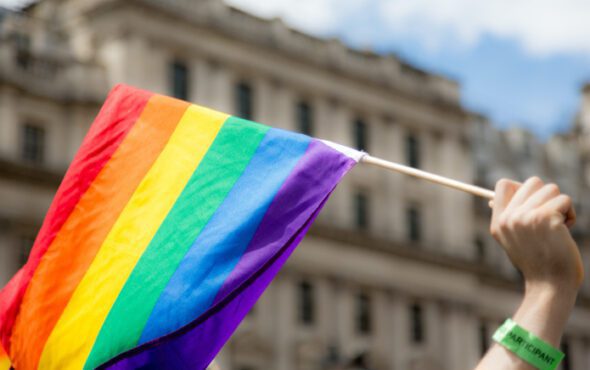
Civil servant Carmen Gonzalez and her wife have always wanted to have children, but the high cost of private fertility treatment made it seem an impossible dream for the Spanish lesbian couple – until now.
A new Spanish government order has been hailed for breaking fresh ground in Europe by extending equal rights to state-funded in-vitro fertilisation (IVF) to lesbians, transgender and non-binary people, who do not identify as either male or female.
“We’re finally equal before the law. Or, at least, a little more equal,” Gonzalez, 38, told the Thomson Reuters Foundation in a video call from Madrid.
“But we also know that we’re privileged here in Spain, compared to other countries in Europe,” she said, adding that she and her wife now planned to start fertility treatment.
Same-sex marriages or civil unions are legal in about 30 European nations, but legislation letting LGBTQ+ people have children – either through adoption, surrogacy or sperm donation – has lagged and free access to fertility treatment is patchy.
Across Europe, 21 countries let one member of a same-sex couple adopt a partner’s child, 18 permit joint adoption and 16 give lesbian couples access to fertility treatments involving donated sperm, according to an estimate based on data from LGBTQ+ rights group ILGA-Europe.
Some countries cover the cost of IVF under state healthcare plans, but the Nov. 5 Spanish order has been praised by LGBTQ+ campaigners for explicitly extending the same rights granted to heterosexual couples to lesbians, trans and non-binary people.
“What Spain has done is unique, (by encoding an) anti-discrimination principle into its assisted reproduction technology service package,” said Cianan Russell, a senior policy officer at ILGA-Europe.
The move might help push other European nations to make their IVF legislation more inclusive, Russell said.
“When one country makes a change, others take note … We hope to see this model put forth as a good practice so that other countries can learn and follow suit,” Russell added.
‘OLD STEREOTYPES’
Little data is available on trans access to IVF across Europe, though a report published this month by the Spanish investigative group Civio said 20 countries – including Britain, the Netherlands and Belgium – allowed it, at least in theory.
Six nations, including Hungary, Poland and Latvia, ban trans people from undergoing fertility treatment, while others – such as Germany – neither prohibit nor overtly allow it.
But even when laws theoretically grant LGBTQ+ people the right to access IVF using donated sperm, the reality is often different, campaigners said.
“There’s a very clear difference between places where in theory all single people, for example, should be able to access IVF, and places where there’s clear protection by the state against discrimination on the basis of being LGBTI,” Russell said.
In Germany, for example, a lack of clarity in federal legislation means many lesbians and trans people find themselves at the mercy of individual fertility clinics’ policy on patients, according to LGBTQ+ people and activists.
That means many are rejected due to prejudice or ignorance, they said.
“It’s all based on very old stereotypes that people still have in their heads: that straight couples should have kids and therefore get help for that, and queer people shouldn’t,” said Noah Triller, a 21-year-old trans man based in Berlin.
According to LSVD, Germany’s biggest LGBTQ+ rights group, Hamburg’s medical association is the country’s only one to explicitly allow IVF for lesbian couples.
In Italy and other countries, a lack of broad access to the treatment pushes many lesbian couples and trans people to look for solutions abroad, said Gabriele Piazzoni, general secretary of the biggest Italian LGBTQ+ group Arcigay.
“And when they return (to Italy), the couples must face a long and tiring judicial procedure to have their parental responsibility recognised,” Piazzoni added.
Some rebuild their lives abroad to avoid such bureaucratic difficulties.
Valentina, a 35-year-old Italian, moved with her partner from Rome to Barcelona in order to undergo IVF in a private Spanish clinic. Once there, they decided to stay.
“It wasn’t easy, but we had the money to do it and, honestly, we did not want to live in a country where our kid might not be fully protected if something happened to one of us,” said Valentina, who asked for her surname not to be used.
‘VERY EXPENSIVE’
But even where laws allow lesbian and trans people to have IVF, patchy or unequal public funding can be a hurdle.
A German federal court ruled recently that a lesbian couple did not have the right to have their fertility treatment covered by their public health insurance, arguing that donated sperm was not included in the scheme.
Berlin and Rhineland-Palatinate are the only two German states offering financial support for lesbian couples and trans people to access IVF in the same conditions as straight couples, according to Bundesverband Trans*, a trans rights group.
Even there, the financial support offered is partial and access to treatment still depends on the policy of individual clinics.
In much of England, same-sex female couples have to pay for six cycles of intrauterine insemination (IUI) – which is cheaper but generally less effective than IVF – at private clinics before being offered six free cycles of IUI, and then IVF.
By comparison, heterosexual couples are offered three free cycles of IVF if they have not conceived after two years of unprotected sex.
While IVF using donated sperm is more expensive, the unequal coverage offered by the National Health Service (NHS) has proved controversial.
Earlier this month, British social media influencers Megan Bacon-Evans and her wife, Whitney, launched a legal case against a branch of the NHS fertility sector in England, accusing it of penalising them because of their sexuality.
Bryony, a lesbian who lives near the city of Bristol in western England, said she hoped the Spanish government order would encourage Britain to overhaul its rules.
“My partner and I are saving quite a lot of money right now to do a few things. We want to buy a house, but we also want to start a family,” the 31-year-old healthcare worker said, declining to give her last name.
“And we know that those two things are very, very expensive, so we might only be able to afford one of them.”
Reporting by Enrique Anarte.
GAY TIMES and Openly/Thomson Reuters Foundation are working together to deliver leading LGBTQ+ news to a global audience.
* Spain grants lesbians, trans people equal IVF rights
* ‘Anti-discrimination principle’ hailed as European model
* Move could push other nations to ease access – activists



